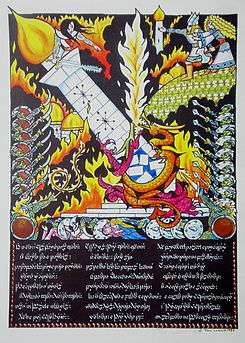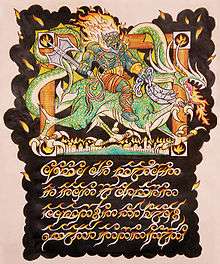Fall of Gondolin

In the writings of J.R.R. Tolkien, the "Fall of Gondolin" is the name of one of the original Lost Tales which formed the basis for a section in his later work, The Silmarillion.
"The Fall of Gondolin" tells of the founding of the Elven city of Gondolin (built in secret by Turgon and his people), of the arrival of Tuor, a prince of the Edain, of the betrayal of the city to Morgoth by Turgon's nephew Maeglin, and of its subsequent destruction by Morgoth's armies. It also relates the flight of the fugitives to the Havens of Sirion, the wedding of Tuor and Idril, as well as the childhood of Eärendil.
Tolkien began writing the story that would become "The Fall of Gondolin" in 1917 in an army barracks on the back of a sheet of military marching music. It is more or less the first traceable story he wrote down on paper about his legendarium.
Tolkien was constantly revising his First Age stories; however, the narrative he wrote in 1917, published posthumously in the Book of Lost Tales, remains the only full account of the fall of the city. The narrative in The Silmarillion was the result of the editing by his son Christopher using that story (minus some elements all too obviously evocative of World War I warfare) and compressed versions from the different versions of the Annals and Quentas as various sources. The later Quenta Silmarillion and the Grey Annals of Beleriand, the main sources for much of the published Silmarillion, both stop before the beginning of the Tuor story.
A partial later version of "The Fall of Gondolin" was published in the Unfinished Tales under the title "Of Tuor and his Coming to Gondolin". Originally titled "Of Tuor and the Fall of Gondolin", this narrative shows a great expansion of the earlier tale. Christopher Tolkien retitled the story before including it in Unfinished Tales, because it ends at the point of Tuor's arrival in Gondolin, never getting to the actual Fall.
There is also an unfinished and (as of 2008) unpublished poem titled The Lay of the Fall of Gondolin of which a few verses are quoted in The Lays of Beleriand. In a mere 130 verses Tolkien reaches the point where dragons attack the city; from this one can assume that, even if it had been finished, it would have been far shorter than the long poetic versions of The Lay of Leithian and Narn i Chîn Húrin.
See also
- Armies and hosts of Middle-earth warfare
- Glorfindel
- Gondolin
- Húrin
- List of Middle-earth weapons
- Middle-earth canon
References
External links
- "Fall of Gondolin". Tolkien Gateway.
